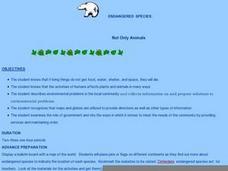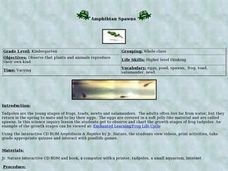Curated OER
Using Blood-Typing to Determine Causes of Death in Surgery Patients
In this simulation activity, young biologists examine blood types to determine whether the death rate in a hospital was caused because of incorrect identification of patient blood types. You will need obtain and follow the procedures of...
Curated OER
The Coriolis Effect
Students will determine the direction of Earth's rotation as viewed from the north and south if they were suspended out in space. They will model how the rotation of the Earth causes currents to be deflected in different directions for...
Curated OER
Chemosynthesis for the Classroom
Explorers set up Windogradsky columns with local mud so that they can culture microorganisms. After three and six weeks they make observations of the mud and the organisms growing in it. In this way they observe succession and relate...
Curated OER
Investigating an Enzyme-controlled Reaction: Catalase and Hydrogen Peroxide Concentration
Are you looking for a way to measure cellular respiration? Try it with pureed potatoes. With some standard high school science equipment, biologists can perform an investigation and collect data surrounding byproducts of respiration. You...
Curated OER
Testing Leaves for Starch: the Technique
Like good scientists, kids often want to see first-hand why things are as they are; they can do just that in the starch-testing photosynthesis activity found here. Depending on the age of your pupils, you may wish to do the investigation...
Curated OER
Investigating Properties of Water: Temperature
Investigate how temperature affects the density of water and stratification that occurs in bodies of water when temperatures vary. Water of differing temperatures is given different colors to see the layers that form. The lesson is meant...
Curated OER
Strong Ice
Through three activities, first-time physical scientists wonder at the properties of water. Freeze some soda cans and a container of water prior to the investigation to show that water expands when frozen. Lab groups experiement with...
Curated OER
All About Seeds!
First graders learn all about seeds. In this biology lesson, 1st graders discover: what a fruit is, what is inside of seeds, and how seeds are transported.
Nuffield Foundation
Dissecting Lungs
Here is a lab activity where teens experience the respiratory system first-hand as they dissect lungs and identify key structures within the system. Although the website is written in British English with some slightly different verbiage...
Nuffield Foundation
A Closer Look at Blood
Here is a lab that has teenage scientists examining samples of their own blood under a microscope. Learners carefully prepare slides, then make detailed observations and identifying different types of cells using a key.
Curated OER
Cow Eye Dissection Lab
Students explore the anatomy of the eye by dissecting a cow eye Students are introduced the concept behind vision and the anatomy to the eye.
Curated OER
SEXUAL LIFE CYCLE DEVELOPMENT USING MONOCYSTIS
Students perform a lab to becoe familar with scientific concepts. The skill of inquiry is essential and this lesson furthers its development. The intelligence of kinesthetics is used as learners perform the many aspects of this lab...
Curated OER
"Honey Dew from Bunny Too!"
The learners will design a lab to test the mechanism that triggers spore dispersal. They should have some clues after making observations of the life cycle. Part of the fun here is to let the students devise a method for testing this...
Curated OER
Bacterial Transformation
Students explore DNA recombination. In this biology instructional activity, students observe the growth of microscopic species. They predict the phenotype of the transformed colonies.
Curated OER
Pheed the World: Edible Phyla
High schoolers discuss the contributions of different organisms to our world. In this biology instructional activity, students research countries with limited food supply. They create an improvement plan for a fictitious country assigned...
Curated OER
DNA Extraction From Living Things
Students extract DNA from split peas. In this biology lesson, students hypothesize what DNA looks like and perform the experiment to verify their hypothesis. They explain the importance of DNA in living things.
Curated OER
Micropipette and the Metric System
Students practice measuring the correct volume using micropipette. In this biology lesson, students determine the correct micropipette tip to use when transferring fluid. They convert metric volume from one unit to another.
Curated OER
Collecting and Classifying Pollen
Students collect and analyze pollen from different species of plants. In small groups, they classify pollen according to shape, size and physical characteristics. They draw the basic anatomy of flowering plants and create a dichotomous...
Curated OER
Cell Cycle, Mitosis and Meiosis
Seventh graders describe the processes involved in mitosis and meiosis. In this life science lesson, 7th graders create chromosome models using strings and beads. They play a jeopardy team game at the end of the unit to review concepts...
Curated OER
Temperature Affects The Heart Rate
Students relate heart rate and development to environmental conditions through experiment. In cooperative groups, students record the heart rate in developing zebra fish. Groups create a standard curve to predict the temperature at...
Curated OER
Endangered Species: Not Only Animals
Students research endangered animals and plants. In this biology lesson, students are read Will We Miss Them? Endangered Species by Alexandra Wright before they begin searching for information to complete an endangered species...
Curated OER
Enemies and Threats to Sea Horses
Students research threats and enemies of the sea horse. In this animal biology activity, students use the Internet to find threats and enemies of sea horses and write a paragraph on their findings.
Curated OER
Watch Me Grow
Students observe that plants need air, food, light, and water to survive. In this plant biology lesson, students observe the growth and development of two plants, one is the control plant and the other is denied either air, water,...
Curated OER
Amphibian Spawns
Students observe tadpoles as they gradually change into adults. In this amphibian biology lesson plan, students watch tadpoles in a tank in the classroom, keep a daily record of what they observe, and chart the growth development...
Other popular searches
- Biology Lab Photosynthesis
- Enzyme Biology Lab
- Biology Lab Microscopes
- Biology Lab Safety
- Biology Lab Skills
- Biology Lab Protocol
- Biology Lab Safety Lesson
- Biology Lab Energy
- Introduction to Biology Labs
- Biology Lab Skills Lesson
- Biology Lab Sskills
- Enzyme Biology Lab Pectinase

























